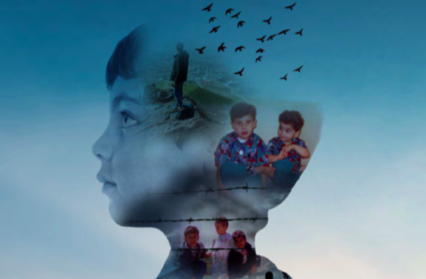Gareth Smith reviews The Boy with Two Hearts, the first production of Wales Millennium Centre’s re-opening season recounting the story of a family of refugees who have fled Afghanistan to come to the UK at the turn of the Millenium.
According to its characters, The Boy with Two Hearts is a story about circles: family circles, circles of friends, community circles and the circle of strangers watching their story unfold. It is the points at which these circles intersect, those moments of connection which form broader links, that this production, based on the book of the same name by Hamed and Hessam Amiri and adapted for the stage by Phil Porter, seeks to evoke as it builds towards an affecting and powerful conclusion. Despite its universal themes of love and hope, it remains an intensely personal play that charts the experience of one family as they risk everything for one another.
A narrative focused on fleeing Afghanistan as the result of the Taliban has given the production an unfortunate timeliness and its depiction of the inhumane treatment of refugees remains as damning now as it was during the play’s setting in 2000. Mohammed (Dana Haqjoo) and Fariba (Géhane Strehler) travel from their homeland to the UK with sons Hessam (Shamail Ali), Hamed (Farshid Rokey) and Hussein (Ahmad Sakhi). Their journey, fraught with violence, exploitation and uncertainty is complicated, however, by Hussein’s precarious health.
Director Amit Sharma builds on some particularly strong performances from his cast with an inventive set design that, in its simplicity, allows for greater theatrical creativity through movement, props and lighting. The use of digital screens also feels essential to the drama rather than a technical gimmick, particularly in its use of individual words, rather than images, to represent objects. It not only draws attention to the play’s focus on language, and its origins in literature, but also to the power of symbols. During one effective scene, two small boots stand in for a young girl at a refugee camp and convey, in her invisibility, much more than a direct performance might have.
Elaha Soroor’s role as the ‘Singer’ is easy to overlook, but it is precisely because she remains detached from the immediate action of the play that her presence adds immeasurably to the ambience created through haunting, elegiac music. The song lyrics, written by Mohammad Sharif Saiidi and Afif Bakhtari, heighten the tense emotions on-stage and Sahoor’s spectrality perfectly symbolises the shadow of death that hangs over the drama.
While embroiled in numerous historical conditions beyond their control, The Boy with Two Hearts is much more the personal story of an individual family than an examination of their geo-political context. The chemistry between the actors is thus paramount, but the central performances complement one another to build familial rapport – particularly the typical combination of affection and endless bickering that defines the brotherly relationship at the centre of the play. The character of Fariba is also a key element of the show’s success. Whereas mother figures in fiction are often made to represent the emotional core of the family, Fariba is also its political engine – it is because of her defiance of the Taliban that the family must flee in the first place – and the complexity and depth of both characterisation and performance ensures her vital significance to the narrative.
The adaptation of their life story for the stage must be a uniquely surreal experience for those portrayed, but the script puts this to good use with several metatheatrical comments on what it means for Hessam and Hamed to be telling this story. It allows them to talk about the events that have shaped their lives and have conversations now that could never take place. Such moments are a key part of the intimacy and sense of community which The Boy with Two Hearts seeks to foster. The play is an invitation into the circle of the Amiri family and it is well worth accepting.
The Boy with Two Hearts is showing until 23 October at WMC’s Weston Studio.











